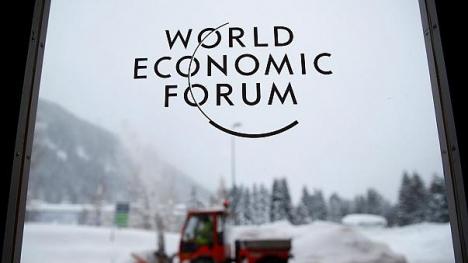Davos 2018: call the doctor
- Opinión

This week, some of the world’s most rich and powerful people travelled to the picturesque town of Davos for the annual World Economic Forum (WEF). The focus this year is on ‘creating a shared future in a fractured world’.
How did it all start?
In 1971, German-born Klaus Schwab organised the WEF’s first meeting in the Swiss Alps, near where Thomas Mann set his 1924 masterpiece The Magic Mountain, in a sick but rarefied Europe inching towards the First World War. Schwab’s work was set in the 1970s, its characters are the CEOs of major corporations and their motivations are to expand their businesses.
The Forum has since developed as a place for CEOs to discuss their future plans with world leaders. Its origin coincided with the breakdown of the established world order following the Second World War, when the US abandoned the fixed dollar/gold relationship and Keynesian economic policies failed to tackle ‘stagflation’ (stagnation combined with inflation).
At that time, neoliberalism was en vogue and the liberalisation of capital flows and trade were upheld as dogmas of good global governance. Schwab believed companies were the key to progress, and he wanted to foster an atmosphere of trust between governments and investors.
The Forum’s supporters believed the economy was too important to leave to the whims of democracies. Politicians decided that, in the words of Margaret Thatcher, ‘there (was) no alternative’ to financial rules determined by investors.
The influence only money can buy
A group of unelected institutions – including independent central banks, the International Monetary Fund, credit rating agencies and the World Trade Organization – would now look after our economic policy.
Ordinary people who worked to make ends meet, and exercised their political power in the ballot box, were now expected to believe economic problems were due to factors outside of their democratic control.
And the suits in Davos achieved that goal. CEOs started to govern according to the mood of their investors. Even the collapse of hedge fund management firm Long Term Capital Management (LTCM) in 1998 did nothing to dent their power.
LTCM was run by Robert C. Merton (Harvard) and Myron S. Scholes (Stanford), who had won the Nobel Prize in Economic the previous year for their econometric models that checked the ‘rationality’ of the financial derivatives system.
Could there be a more fitting example of the unstoppable force of capitalism, when LTCM went bankrupt and nearly plunged the world into a global crisis? Merton and Scholes didn’t even have the decency to hand their prize back and Davos did nothing to stop the ideological fever that prevailed... until the financial crisis of 2007/8, that is.
Alternative reality
Since 1999, ordinary people have been convening at the gates of the WEF to protest against everything the meeting stands for. That is the other side of Davos.
In 2001, sceptics set up a separate meeting in the Brazilian city of Porto Alegre – the World Social Forum – to discuss alternatives to the kind of capitalism promoted by Davos. The WEF’s response was to invite representatives of alter-globalisation movements to their discussions.
Democratically-elected politicians have also attended World Social Forum meetings, including President Lula da Silva of Brazil in 2003.
So, what did Davos do with Lula’s proposals to limit the free movement of capital, eliminate tax havens and create a global fund to fight poverty? Nothing. The problem with Davos has been the same since 1971: it wants companies to run society and control political decisions.
The WEF bears some responsibility for creating the ‘fractured world’ it is so scared of. It expects the world fall into line with the false ‘rational expectations’ of CEOs and companies under the pretence that ‘there is no alternative’.
Rise of the far-right
But Donald Trump, Brexit, the rise of the far-right in Europe and elsewhere, and growing geopolitical turbulence all suggest the WEF’s remedies are ineffective. Authoritarian politics is gaining ground. It feeds off fear of migrants, foreign countries, and the poor. Yet the far-right’s rise is actually the result of a perverse ideology embraced by businessmen and politicians who ignore the cries of their children.
As Nobel Prize in Economics recipient Joseph Stiglitz said, the globalisation agenda ‘was set behind closed doors, by corporations. It was an agenda written by, and for, large multinational companies, at the expense of workers and ordinary citizens everywhere’.
It is workers who have suffered from the outset. Unions have a simple and straightforward way to repair the ‘fractured world’ described by the Davos-clique. We have to restructure political and economic life, under the guidance of social inclusion and coexistence.
But this can only be achieved in a democracy if we regain sovereignty over the economy. And it depends on societies democratically electing which multilateral institutions should define the global rules of play. The first job will be to open the ‘black box’ of an economy dominated by unbridled finances, managed by the suits in Davos. Can we put that on the World Economic Forum agenda?
- Victor Baez Mosqueira, General Secretary of the 'Trade Union Confederation of the Americas' (TUCA).
http://www.ips-journal.eu/regions/global/article/show/davos-2018-call-the-doctor-2544/
Del mismo autor
- Desidia global con los pueblos indigenas 01/10/2021
- Pandemia y crisis del mutilateralismo 11/02/2021
- El conflicto en el contrato social 27/01/2021
- Desastre ko Marito 30/11/2020
- Reforma del Estado en Paraguay (o los bomberos pirómanos) 16/04/2020
- Coronavirus, trabajadores y un mundo en disputa 31/03/2020
- Davos 2018: call the doctor 24/01/2018
- Davos 2018: llamen al doctor 24/01/2018
- Technological modernization with societies of inclusion? 12/01/2018
- ¿Modernización tecnológica con sociedades de inclusión? 11/01/2018








